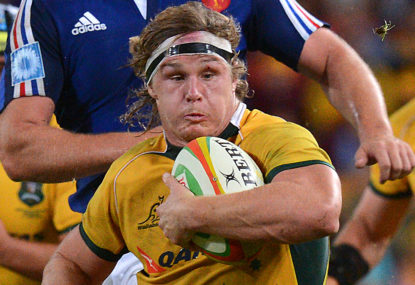While I was a young rugby player I was also an infantry officer in the Australian Army.
During the weekdays I would train with other grown men crawling around in the dirt, fostering controlled aggression and implementing plans with decisiveness, knowledge and self belief.
On the weekends I would throw on footy shorts and do exactly the same thing.
One of the hardest things for a young officer was walking into a platoon that had been commanded by a Sergeant in his absence and attempt to take the reins as smoothly as possible.
Even with the military culture being as strictly hierarchical and supportive of such leadership changes, there would always be a certain amount of friction and in some cases resentment, as the new commander was appointed while the interim choice stepped aside to offer support and advice.
During the most successful World Cup bids by Australian rugby – Nick Farr Jones led 1991 World Cup side, the John Eales led 1999 side and the overachieving 2003 George Gregan led side – there has been a stand out of constants.
Firstly, that the side would field at least half a team of players that were considered the absolute best in the world at their respective position, that there was an innovative coach, that there was a strong experience base and leadership group and, finally, that there was a leader who stood head and shoulders above the rest.
Although in 1991 there was a bevy of leaders on the field from Simon Poidevin and Micheal Lynagh to a young John Eales and Phil Kearns – there was no question in anyone’s mind heading into the tournament that Nick Farr Jones was captain.
Similarly in 1999, John Eales was without doubt the man who was preferred by all to be the man in the hot seat.
In 2003 it was George Gregan’s very Steve Waugh-like approach to the Wallabies captaincy that exacted a work ethic out of a team that had them almost steal the World Cup from the greatest English side that has ever played.
After the French Test series we seem in a worse position than ever to define who is the Australian captain for the next World Cup. If every player that has worn the armband is in career best form come then who would you select?
Michael Hooper is a captain that fits the mould for Australia. Tough, articulate, explosive, tireless and talented. There is a clear argument that his form at present makes him irreplaceable in the team.
That is until David Pocock returns.
We were quick to forget how good George Smith was until he returned for the Brumbies last season and outplaying everyone. Pocock in form is the man who deposed Smith in his prime. As good as Hooper is, it would be very hard to imagine him turning in a performance as complete as Pocock’s against the Sprinboks in the last Rugby World Cup semi-final.
It was not long ago that James Horwill seemed like the man to take the Wallabies armband for the next few years. Even under the constant cloud of injury his talisman-like effect on the Reds even from the sidelines made him a favourite of pundits and selectors alike.
Ben Mowen held the armband after Horwill and Will Genia lost form, and Stephen Moore seemed an obvious choice after Mowen’s departure. But once the injuries have healed and World Cup selection looms, who is the stand out?
It is a nice thought that they would all be gracious to give up the captain’s armband. In a team full of elite alpha male competitors it is not realistic to expect it. When such a large portion have tasted the honour without a clear successor it will no doubt create friction.
The truth is that among the 20 alpha males of a rugby Test team, and like all combat units, it must have a clear and distinguishable leader.
How important is the team captain to the team’s performance? Although it would be hard to argue that the rugby captain’s role on the field has as great an effect on a rugby team as, let’s say, a Test cricket team, the type of leader required is one that sets an example at all times.
He needs to inspire the younger, more wayward players to act in the interests of team, foster respect for the honour of playing for the Wallabies and appreciate the privileges and burdens that comes from being an idol of the masses.
In professional sport, where salaries are as inflated as some of the egos, a lack of defined leadership can be as destructive as poor leadership. Just ask the English football team.
McKenzie knows people. His ability to keep good players at the Reds, regardless of their wooden spoon status, and attempts to build leaders in the ranks have been proven. Even his promotion of Quade Cooper to vice captain seems to be a masterstroke to bring out the best in the mercurial fly half.
McKenzie understands that some individuals will raise their performance to suit the role, where others will carry it like a burden. The musical chairs approach with the captaincy of late, however, has reached a point were it is diluting the prestige of the position and and placing limits on the appointed captain’s cultural influence.
The ARU has to get behind a man to lead us to the next World Cup. I believe in terms of character, poise and sheer physical presence it is very hard to disregard a healthy David Pocock. When all of the recent leaders are lined up and in form, he stands out from the esteemed crowd.
Who would you pick?





























































































